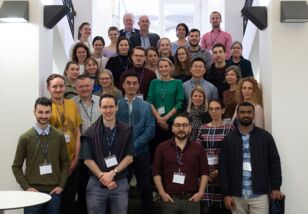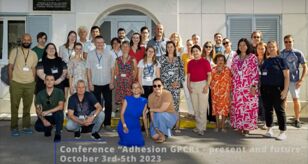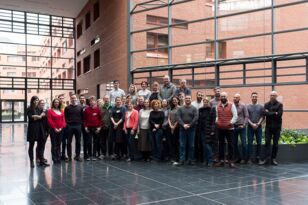Achievements
The Action was successfully launched November 14th 2019 in Brussels at our kick-off meeting. In an exciting, motivating and highly interactive meeting the Management Committee, then consisting of 21 countries, met for the first time to establish the organisational structures of this network and to set the plan for the upcoming Grant Period.
A screen of pharmacologically active compounds to identify modulators of the Adgrg6/Gpr126 signalling pathway in zebrafish embryos
Asad A, Shahidan NO, de la Vega de León A, Wiggin GR, Whitfield TT, Baxendale S
Basic Clin Pharmacol Toxicol. 2023 Oct
doi: 10.1111/bcpt.13923.
Adhesion G Protein-Coupled Receptor Gpr126 (Adgrg6) Expression Profiling in Diseased Mouse, Rat, and Human Kidneys
Kösters P, Cazorla-Vázquez S, Krüger R, Daniel C, Vonbrunn E, Amann K, Engel FB
Cells. 2024 May 18
doi: 10.3390/cells13100874.
Molecular sensing of mechano- and ligand-dependent adhesion GPCR dissociation
Scholz N, Dahse A, Kemkemer M, Bormann A, Auger GM, Contreras FV, Ernst LF, Staake H, Körner MB, Buhlan M, Meyer-Mölck A, Chung YK, Blanco-Redondo B, Klose F, Jarboui MA, Ljaschenko D, Bigl M, Langenhan T
Nature. 2023 Mar
doi: 10.1038/s41586-023-05802-5.
Unveiling Mechanical Activation: GAIN Domain Unfolding and Dissociation in Adhesion GPCRs
Fu C, Huang W, Tang Q, Niu M, Guo S, Langenhan T, Song G, Yan J
Nano Lett. 2023 Oct
doi: 10.1021/acs.nanolett.3c01163.
Optimized genetic code expansion technology for time-dependent induction of adhesion GPCR-ligand engagement
Streit M, Hemberger M, Häfner S, Knote F, Langenhan T, Beliu G
Protein Sci. 2023 Apr
doi: 10.1002/pro.4614.
Dysfunction of the adhesion G protein-coupled receptor latrophilin 1 (ADGRL1/LPHN1) increases the risk of obesity
Dietzsch AN, Al-Hasani H, Altschmied J, Bottermann K, Brendler J, Haendeler J, Horn S, Kaczmarek I, Körner A, Krause K, Landgraf K, Le Duc D, Lehmann L, Lehr S, Pick S, Ricken A, Schnorr R, Schulz A, Strnadová M, Velluva A, Zabri H, Schöneberg T, Thor D, Prömel S
Signal Transduct Target Ther. 2024 Apr 26
doi: 10.1038/s41392-024-01810-7.
Downstream signalling of the disease-associated mutations on GPR56/ADGRG1
Cevheroğlu O, Demir N, Kesici MS, Özçubukçu S, Son CD
Basic Clin Pharmacol Toxicol. 2023 Apr 13
doi: 10.1111/bcpt.13873
Upregulation of mRNA Expression of ADGRD1/GPR133 and ADGRG7/GPR128 in SARS-CoV-2-Infected Lung Adenocarcinoma Calu-3 Cells
Žáčková S, Pávová M, Trylčová J, Chalupová J, Priss A, Lukšan O, Weber J
Cells. 2024 May 7
doi: 10.3390/cells13100791
Cryo-EM structure of cell-free synthesized human histamine 2 receptor/Gs complex in nanodisc environment.
Köck Z, Schnelle K, Persechino M, Umbach S, Schihada H, Januliene D, Parey K, Pockes S, Kolb P, Dötsch V, Möller A, Hilger D, Bernhard F.
Nat Commun. 2024 Feb 28;15(1):1831
doi: 10.1038/s41467-024-46096-z.
Translating the force-mechano-sensing GPCRs
Wilde C, Mitgau J, Suchy T, Schöneberg T, Liebscher I
Am J Physiol Cell Physiol. 2022 Jun 1
doi: 10.1152/ajpcell.00465.2021.
Affinity Proteomics Identifies Interaction Partners and Defines Novel Insights into the Function of the Adhesion GPCR VLGR1/ADGRV1
Knapp B, Roedig J, Roedig H, Krzysko J, Horn N, Güler BE, Kusuluri DK, Yildirim A, Boldt K, Ueffing M, Liebscher I, Wolfrum U
Molecules 2022 May
doi: 10.3390/molecules27103108
The adhesion GPCR and PCP component flamingo (FMI-1) alters body size and regulates the composition of the extracellular matrix
Schön JL, Groß VE, Post WB, Daum A, Matúš D, Pilz J, Schnorr R, Horn S, Bäumers M, Weidtkamp-Peters S, Hughes S, Schöneberg T, Prömel S
Matrix Biol. 2024 Feb 18
doi: 10.1016/j.matbio.2024.02.005.
Adhesion GPCR Gpr126 (Adgrg6) Expression Profiling in Zebrafish, Mouse, and Human Kidney
Cazorla-Vazquez S, Kösters P, Bertz S, Pfister F, Daniel C, Dedden M, Zundler S, Jobst-Schwan T, Amann K, Engel FB
Cells. 2023 Aug 2
doi: 10.3390/cells12151988.
The repertoire and structure of adhesion GPCR transcript variants assembled from publicly available deep-sequenced human samples
Kuhn CK , Stenzel U, Berndt S, Liebscher I, Schöneberg T, Horn S
Nucleic Acids Res. 2024 Apr 24
doi: 10.1093/nar/gkae145.
The dark sides of the GPCR tree - research progress on understudied GPCRs.
Scharf MM, Humphrys LJ, Berndt S, Di Pizio A, Lehmann J, Liebscher I, Nicoli A, Niv MY, Peri L, Schihada H, Schulte G. Br
J Pharmacol. 2024 Feb 10
doi: 10.1111/bph.16325.
Intramolecular activity regulation of adhesion GPCRs in light of recent structural and evolutionary information
Kleinau G, Ali AH, Wiechert F, Szczepek M, Schmidt A, Spahn CMT, Liebscher I, Schöneberg T, Scheerer P
Pharmacol Res. 2023 Oct 30
doi: 10.1016/j.phrs.2023.106971.
The N Terminus of Adhesion G Protein-Coupled Receptor GPR126/ADGRG6 as Allosteric Force Integrator
Mitgau J, Franke J, Schinner C, Stephan G, Berndt S, Placantonakis DG, Kalwa H, Spindler V, Wilde C, Liebscher I
Front Cell Dev Biol. 2022 Jun 23
doi: 10.3389/fcell.2022.873278.
Structural basis for the tethered peptide activation of adhesion GPCRs
Ping Y, Xiao P, Yang F, Zhao R, Guo S, Yan X, Wu X, Zhang C, Lu Y, Zhao F, Zhou F, Xi Y, Yin W, Liu F, He D, Zhang D, Zhu Z, Jiang Y, Du L, Feng S, Schöneberg T, Liebscher I, Xu EH, Sun J
Nature. 2022 Apr 13
doi: 10.1038/s41586-022-0419-y.
The posttraumatic increase in the Adhesion GPCR EMR2/ADGRE2 to circulating neutrophils is not related to injury severity.
Zheng L, Rang M, Fuchs C, Keß A, Wunsch M, Hentschel J, Hsiao CC, Kleber C, Osterhoff G, Aust G.
Cells. 2023 Nov 20;12(22):2657.
doi: 10.3390/cells12222657
CDK7/12/13 inhibition targets an oscillating leukemia stem cell network and synergizes with venetoclax in acute myeloid leukemia.
He L, Arnold C, Thoma J, Rohde C, Kholmatov M, Garg S, Hsiao CC, Viol L, Zhang K, Sun R, Schmidt C, Janssen M, MacRae T, Huber K, Thiede C, Hébert J, Sauvageau G, Spratte J, Fluhr H, Aust G, Müller-Tidow C, Niehrs C, Pereira G, Hamann J, Tanaka M, Zaugg JB, Pabst C.
EMBO Mol Med. 2022 Apr7;14(4):e14990.
doi: 10.15252/emmm.202114990
The Evolutionary History of Vertebrate Adhesion GPCRs and Its Implication on Their Classification
Wittlake A, Prömel S, Schöneberg T
Int J Mol Sci. 2021 Oct 30
doi: 10.3390/ijms222111803.
A guide to adhesion GPCR research.
Liebscher I, Cevheroğlu O, Hsiao CC, Maia AF, Schihada H, Scholz N, Soave M, Spiess K, Trajković K, Kosloff M, Prömel S.
FEBS J. 2021 Nov 2. Online ahead of print.
doi: 10.1111/febs.16258.
Adhesion GPCR GPR56 Expression Profiling in Human Tissues
Kaiser F, Morawski M, Krohn K, Rayes N, Hsiao C, Quaas M, Aust G
Cells. 2021 Dec 16
doi: 10.3390/cells10123557.
Phospholipid-flippase chaperone CDC50A is required for synapse maintenance by regulating phosphatidylserine exposure
Li T, Yu D, Oak HC, Zhu B, Wang L, Jiang X, Molday RS, Kriegstein A, Piao X
EMBO J. 2021 Nov 2
doi: 10.15252/embj.2021107915.
Latrophilin-1 drives neuron morphogenesis and shapes chemo- and mechanosensation-dependent behavior in C. elegans via a trans function
Matúš D, Post WB, Horn S, Schöneberg T, Prömel S
Biochem Biophys Res Commun. 2022 Jan 22
doi: 10.1016/j.bbrc.2021.12.006.
Mimicking extracellular matrix-mediated mechano-activation by antibodies to control signaling of the adhesion G protein-coupled receptor GPR126/ADGRG6.
Jakob Mitgau, Julius Franke, Camilla Schinner, Gabriele Stephan, Sandra Berndt, Dimitris G. Placantonakis, Hermann Kalwa, Volker Spindler, Caroline Wilde, Ines Liebscher.
doi: https://doi.org/10.1101/2021.09.13.460127
Elevated expression of the adhesion GPCR ADGRL4/ELTD1 promotes endothelial sprouting angiogenesis without activating canonical GPCR signalling.
David M Favara, Ines Liebscher, Ali Jazayeri, Madhulika Nambiar, Helen Sheldon, Alison H Banham, Adrian L Harris.
Sci Rep. 2021 Apr 23;11(1):8870.
doi: 10.1038/s41598-021-85408-x
Functional impact of intramolecular cleavage and dissociation of adhesion G protein-coupled receptor GPR133 (ADGRD1) on canonical signaling.
Joshua D Frenster, Gabriele Stephan, Niklas Ravn-Boess, Devin Bready, Jordan Wilcox, Bjoern Kieslich, Caroline Wilde, Norbert Sträter, Giselle R Wiggin, Ines Liebscher, Torsten Schöneberg, Dimitris G Placantonakis.
Biol Chem. Jan-Jun 2021;296:100798. Epub 2021 May 20.
doi: 10.1016/j.jbc.2021.100798.
Expression profiling of the adhesion G protein-coupled receptor GPR133 (ADGRD1) in glioma subtypes.
Frenster JD, Kader M, Kamen S, Sun J, Chiriboga L, Serrano J, Bready D, Golub D, Ravn-Boess N, Stephan G, Chi AS, Kurz SC, Jain R, Park CY, Fenyo D, Liebscher I, Schöneberg T, Wiggin G, Newman R, Barnes M, Dickson JK, MacNeil DJ, Huang X, Shohdy N, Snuderl M, Zagzag D, Placantonakis DG.
Neurooncol Adv. 2020 Apr 28;2(1):vdaa053.
doi: 10.1093/noajnl/vdaa053.
eCollection 2020 Jan-Dec
GPCRmd uncovers the dynamics of the 3D-GPCRome
Rodríguez-Espigares I; Mariona Torrens-Fontanals; Johanna K. S. Tiemann; David Aranda-García; Juan Manuel Ramírez-Anguita; Tomasz Maciej Stepniewski; Nathalie Worp; Alejandro Varela-Rial; Adrián Morales-Pastor; Brian Medel-Lacruz; Gáspár Pándy-Szekeres; Eduardo Mayol; Toni Giorgino; Jens Carlsson; Xavier Deupi; Slawomir Filipek; Marta Filizola; José Carlos Gómez-Tamayo; Angel Gonzalez; Hugo Gutiérrezde-Terán; Mireia Jiménez-Rosés; Willem Jespers; Jon Kapla; George Khelashvili; Peter Kolb; Dorota Latek; Maria Marti-Solano; Pierre Matricon; Minos-Timotheos Matsoukas; Przemyslaw Miszta; Mireia Olivella; Laura Perez-Benito; Davide Provasi; Santiago Ríos; Iván R. Torrecillas; Jessica Sallander; Agnieszka Sztyler; Silvana Vasile; Harel Weinstein; Ulrich Zachariae; Peter W. Hildebrand; Gianni De Fabritiis; Ferran Sanz; David E. Gloriam; Arnau Cordomi; Ramon Guixà-González; Jana Selent
Nature Methods 2020 Aug;17(8):777-787
DOI doi:10.1038/s41592-020-0884-y
The expanding functional roles and signaling mechanisms of adhesion G protein-coupled receptors.
Morgan RK, Anderson GR, Araç D, Aust G, Balenga N, Boucard A, Bridges JP, Engel FB, Formstone CJ, Glitsch MD, Gray RS, Hall RA, Hsiao CC, Kim HY, Knierim AB, Kusuluri DK, Leon K, Liebscher I, Piao X, Prömel S, Scholz N, Srivastava S, Thor D, Tolias KF, Ushkaryov YA, Vallon M, Van Meir EG, Vanhollebeke B, Wolfrum U, Wright KM, Monk KR, Mogha A.
Ann N Y Acad Sci. 2019 Nov;1456(1):5-25.
doi: 10.1111/nyas.14094.
The repertoire of Adhesion G protein-coupled receptors in adipocytes and their functional relevance
Suchý T, Zieschang C, Popkova Y, Kaczmarek I, Weiner J, Liebing A, Çakir MV, Landgraf K, Gericke M, Pospisilik JA, Körner A, Heiker JT, Dannenberger D, Schiller J, Schöneberg T, Liebscher I, Thor D
Int J Obes (London). 2020 Mar 19
doi: 10.1038/s41366-020-0570-2
Structural Basis of Teneurin-Latrophilin Interaction in Repulsive Guidance of Migrating Neurons
Del Toro D, Carrasquero-Ordaz MA, Chu A, Ruff T, Shahin M, Jackson VA, Chavent M, Berbeira-Santana M, Seyit-Bremer G, Brignani S, Kaufmann R, Lowe E, Klein R, Seiradake E
Cell. 2020 Jan 9
doi: 10.1016/j.cell.2019.12.014.
Mutations in G Protein-Coupled Receptors: Mechanisms, Pathophysiology and Potential Therapeutic Approaches
Schöneberg T, Liebscher I
Pharmacol Rev. 2021 Jan
doi: 10.1124/pharmrev.120000011.
Arrestin-independent constitutive endocytosis of GPR125/ADGRA3
Spiess K, Bagger SO, Torz LJ, Jensen KHR, Walser AL, Kvam JM, Møgelmose AK, Daugvilaite V, Junnila RK, Hjortø GM, Rosenkilde MM
Ann N Y Acad Sci. 2019 Oct 29
doi: 10.1111/nyas.14263.
Training School on “Visualisation and Analysis of Structural Data"
20.03.2024–21.03.2024
University of Oxford, Oxford, UK
Organizer: Elena Seiradake (University of Oxford, UK)
Trainers:
- Prof. Elena Seiradake (Oxford, UK)
- Dr. Ed Lowe (University of Oxford, UK)
- Dr. Kamel el Omari (University of Oxford, UK)
Training School on “Cell-based assays to study Adhesion GPCR function"
28.06.2023–30.06.2023
Karolinska Institutet, Stockholm, Sweden
Organizers: Hannes Shihada, Lukas Grätz (Karolinska Institutet, Stockholm, Sweden)
Trainers:
- Prof. Ines Liebscher (Leipzig, DE)
- Prof. Evi Kostenis (Bonn, DE)
- Prof. Miriam Stoeber (Geneva, CH)
- Dr. Hannes Schihada (Marburg, DE)
- Dr. Lukas Grätz (Stockholm, SE)
Training School “Bioinformatics approaches in adhesion GPCR research”
07.09 2022–09.09.2022
University of Belgrade, Serbia
Organizers: Biljana Stankovic (Institute of Molecular Genetics and Genetic Engineering, University of Belgrade, RS), Nikola Kotur (Institute of Molecular Genetics and Genetic Engineering, University of Belgrade, RS), Milan Secanski (Vinča Institute of Nuclear Sciences, University of Belgrade, RS)
Trainers:
- Vladimir Jovanović (Berlin DE)
- Andrea Gelemanović (Split, HR)
- Dr. Teodora Đikić (Strasbourg, FR)
Structure-Function-Analyses of Adhesion GPCRs
Virtual Training School
2021-09-13 to 2021-09-14
Organizers: Laura Kilpatrick & Mark Soave (University of Nottingham, UK)
Trainers:
- Martin Gustavsson (KU, DK)
- Dimitry Veprintsev (UoN, UK)
- Eline Koers (UoN, UK)
- Gáspár Pándy-Szekeres (KU, DK)
- Jarkko Lackman (KU, DK)
- Albert Kooistra (KU, DK)
Animal models for Adhesion GPCR research
Virtual Training School
2020-10-05 to 2020-10-06
Organizer: Katarina Trajkovic (Mediterranean Institute for Life Sciences Split, HR)
Trainers:
- Jörg Hamann (Amsterdam University Medical Centers, Netherlands)
- Samantha Hughes (Hogeschool van Arnhem en Nijmegen, Netherlands)
- Hsi-Hsien Lin (Chang-Gung University College of Medicine, Taiwan)
- Kelly Monk (Oregon Health & Science University, USA)
Deliverable 1
Implementation of bioinformatic tools to provide tissue-specific expression analysis and variant analysis
(single nucleotide polymorphisms, mutations, splice variants)
Proof of progress with achieving the deliverable:
https://doi.org/10.1093/nar/gkae145
Deliverable 2
New transcriptome data establishment including sample harvesting and preparation, sample sequencing and bioinformatical analysis (genome assembly, splice variant analysis, comparison between species with identification of conservation or new variants, genotype/phenotype associations)
Proof of progress with achieving the deliverable:
doi: 10.1016/j.matbio.2024.02.005
doi: 10.1016/j.bbrc.2021.12.006
doi: 10.3390/ijms222111803
doi: 10.3390/cells12151988
doi: 10.1038/s41366-020-0570-2
Deliverable 3
Structure studies including protein purification for crystal structures, NMR studies, antibody and nanobody production, spectroscopy studies (NMR, DEER), Crystal structures of functional domains and full-length receptors.
Proof of progress with achieving the deliverable:
doi: 10.1038/s41586-022-04619-y
doi: 10.1016/j.phrs.2023.106971
doi: 10.1016/j.cell.2019.12.014
Deliverable 4
Structure-function studies including analysis of receptor expression, mutagenesis and signal transduction of identified variants.
Proof of progress with achieving the deliverable:
doi: 10.3389/fcell.2022.873278
doi: 10.15252/embj.2021107915
doi: 10.3390/cells10123557
doi: 10.3390/cells12151988
doi: 10.3390/cells13100791
doi: 10.1111/bcpt.13873
doi: 10.3390/cells13100874
doi: 10.1038/s41392-024-01810-7
doi: 10.1111/bcpt.13873
doi: 10.1101/2021.09.13.460127
doi: 10.1016/j.jbc.2021.100798
doi: 10.1093/noajnl/vdaa053
doi: 10.1124/pharmrev.120.000011
Deliverable 5
Analysis of activation modes of aGPCRs (defining mechano-activation, ligand and small compound screens, agonist binding pocket identification, identification of signalling pathways and networks)
Proof of progress with achieving the deliverable:
doi: 10.1016/j.bbrc.2021.12.006
doi: 10.1111/nyas.14263
doi: 10.1101/2021.09.13.460127
doi: 10.3390/cells12111551
doi: 10.1002/pro.4614
doi: 10.1038/s41586-023-05802-5
doi: 10.3389/fcell.2022.873278
doi: 10.3390/molecules27103108
doi: 10.1152/ajpcell.00465.2021
doi. 10.1016/j.phrs.2023.106971
doi: 10.1021/acs.nanolett.3c01163
doi: 10.1111/bcpt.13923
doi: 10.1016/j.celrep.2023.112679
doi: 10.7554/eLife.69061
Deliverable 6
Predictive receptor modelling that should implement structural and functional data to provide information on the dynamic changes under activation. Docking models should provide hits for agonists and antagonists that will be tested in screening assays.
Proof of progress with achieving the deliverable:
doi: 10.1016/j.molcel.2020.12.042
doi: 10.3390/ijms24097788
doi: 10.1016/j.jbc.2023.105356
Deliverable 7
Evaluation of disease-relevant mutations including 1) mutant receptor cloning, expression and signal transduction analysis, 2) establishment of mutant animal models and 3) In-depth phenotyping of mutant animal models.
Proof of progress with achieving the deliverable:
doi: 10.1002/dvg.23417
doi: 10.1038/s41392-024-01810-7
Deliverable 8
Establishment of different disease models in mouse, C. elegans, D. melanogaster and D. rerio and analysis of differences in aGPCR expression, splice variants or mutations in tissues affected in disease model.
Proof of progress with achieving the deliverable:
doi: 10.1002/dvg.23417
doi: 10.1016/j.matbio.2024.02.005
doi: 10.1016/j.bbrc.2021.12.006
doi: 10.1016/j.celrep.2023
doi: 10.1038/s41586-023-05802-5
doi: 10.3390/cells13100874
doi: 10.7554/eLife.56738
doi: 10.1038/s41392-024-01810-7
Deliverable 9
Establishment of genetic signatures related to aGPCRs to establish as diagnostic tools.
Proof of progress with achieving the deliverable:
doi: 10.1111/bcpt.13873
Deliverable 10
Application of identified mechanical properties, agonists or antagonists to established disease models.
Proof of progress with achieving the deliverable:
doi: 10.1111/bcpt.13873
Deliverable 11
Antibody, nanobody and compound production and evaluation in vitro and in animal models.
Proof of progress with achieving the deliverable:
doi: 10.3390/cells10123557
doi: 10.1016/j.jbc.2022.101949
doi: 10.3389/fimmu.2018.02830
Deliverable 12
To launch and maintain a technology platform accessible to all aGPCR researchers containing information on technologies and expertise every member can provide to the network for shared use (e.g. whole-genome sequencers, high-throughput imaging platforms, sample databanks).
Proof of progress with achieving the deliverable:
See “News” section for novel technologies. Further, a technology database is available in the members area.
Deliverable 13
Providing information on the availability of novel techniques to study aGPCRs such as protocols online and development of novel tools/techniques.
Proof of progress with achieving the deliverable:
See “News” section for novel technologies.
Deliverable 14
Dissemination of findings and progress among scientists and stakeholders through an Action webpage.
Proof of progress with achieving the deliverable:
See “News” section.
Core Group Meeting
08.02.2024
Funchal, Madeira, PT
Core Group Meeting
04.09.2023
Porto, PT
Virtual Mobility Grant
2021-09-27 to 2021-10-31
Ligand screening network for aGPCR
Virtual Mobility Grant
2021-10-01 to 2021-10-31
Transfer of knowledge on the design and application of optical biosensors to study adhesion GPCR function
Virtual Mobility Grant
2021-09-27 - 2021-10-30
Accurate modeling of aGPCR using AlphaFold2
Virtual Mobility Grant
2021-09-27 to 2021-10-15
Library Screening of Potential Adhesion G Protein-Coupled Receptor (aGPCR) Ligands
Virtual Mobility Grant
2021-10-05 to 2021-10-31
Advancing the set up of an adhesion GPCR Technology Database - engaging and empowering the network
Virtual Mobility Grant
2021-10-15 to 2021-10-25
Exploring the effects of electronic cigarettes on the expression of adhesion GPCRs




